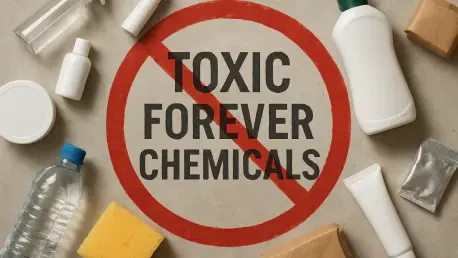In a groundbreaking step toward safeguarding public health and the environment, California is poised to enact sweeping legislation that could redefine consumer safety standards across the nation. Senate Bill 683, a proposed law targeting per- and polyfluoroalkyl substances (PFAS), often dubbed “forever chemicals,” seeks to prohibit their use in a wide array of everyday products. These chemicals, valued for their water-resistant and nonstick properties, are found in items ranging from cookware to food packaging, yet they carry alarming health risks. Scientific studies have connected PFAS exposure to severe conditions like cancer, immune system impairment, and developmental harm in unborn children. As these substances persist indefinitely in the environment and human bodies, the urgency to address their pervasive presence has never been clearer. This legislative push not only highlights a growing awareness of toxic hazards but also positions California as a leader in confronting an issue that affects millions daily.
Legislative Efforts to Combat PFAS Exposure
Pushing for a Safer Marketplace
California’s Senate Bill 683 represents a bold stride in the fight against toxic forever chemicals, building on existing state restrictions that already limit PFAS in cosmetics, children’s products, and firefighting foam. Having gained approval from the state legislature, the bill now awaits the signature of Governor Gavin Newsom to become law, potentially setting a new benchmark for consumer safety. If enacted, this legislation will ban the sale and distribution of numerous products containing PFAS, addressing their widespread use in items like dental floss and ski wax. The health implications are profound, as these chemicals can seep into food or be absorbed through skin contact, posing risks that range from hormonal disruptions to life-threatening diseases. This move underscores a commitment to protecting vulnerable populations and preventing long-term environmental damage, reflecting a broader shift toward prioritizing public well-being over industrial convenience in product manufacturing.
Aligning with a National Movement
Beyond California’s borders, a growing number of states are joining the battle against PFAS, signaling a national awakening to the dangers of these persistent chemicals. States such as Minnesota, Colorado, and Connecticut have already implemented bans on PFAS in various consumer goods, creating a patchwork of regulations that could inspire federal action. California’s potential legislation carries added weight due to its status as one of the world’s largest economies, often influencing market trends on a grand scale. Experts suggest that manufacturers may opt to remove PFAS from all products rather than develop separate lines for different regions, effectively setting a de facto standard nationwide. This ripple effect could accelerate the phase-out of harmful substances, reducing exposure risks for countless individuals. The convergence of state-level initiatives highlights a shared recognition of the urgent need to tackle an environmental crisis that transcends geographic boundaries, pushing for safer alternatives in everyday items.
Practical Steps and Broader Implications
Empowering Individuals to Reduce Exposure
While legislative measures form a critical line of defense against PFAS, individuals can also take actionable steps to minimize their exposure to these toxic substances in daily life. Simple changes, such as avoiding plastic grocery bags and choosing plastic-free alternatives for household items, can make a significant difference in reducing contact with forever chemicals. Opting for cookware and food packaging free of nonstick coatings is another practical approach, as these often contain PFAS that can leach into meals over time. Public awareness campaigns are increasingly emphasizing the importance of reading product labels and seeking out safer options, empowering consumers to make informed choices. This dual strategy of personal responsibility and systemic change creates a comprehensive framework for addressing the pervasive nature of PFAS, which have been detected in human blood, soil, and groundwater. By combining individual actions with policy efforts, the path to a healthier environment becomes more attainable for communities everywhere.
Setting a Precedent for Future Safety Standards
Reflecting on the journey, California’s proactive stance against PFAS marked a pivotal moment in the ongoing struggle for consumer and environmental safety. The potential enactment of Senate Bill 683 stood as a testament to the power of legislative will in confronting hidden dangers in everyday products. Beyond immediate health benefits, this initiative sparked discussions on the economic implications, as the state’s influence likely pressured industries to rethink their reliance on harmful chemicals. Looking ahead, the focus shifted to sustaining momentum through continued advocacy for stricter regulations and innovation in safer materials. Stakeholders were encouraged to monitor the outcomes of such bans, learning from their impact to refine future policies. The collaboration between lawmakers, environmental experts, and the public emerged as a cornerstone for progress, ensuring that the fight against toxic substances remained a priority. This collective effort paved the way for healthier standards, inspiring other regions to follow suit with renewed determination.









